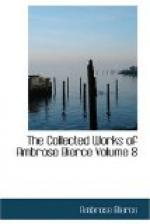Milton, the greatest of the Puritans—intellectual ancestry of the modern degenerate Prudes—had a wholesome love of the dance, and nowhere is his pen so joyous as in its description in the well known passage from “Comus” which, should it occur to my memory while delivering a funeral oration, I am sure I could not forbear to quote, albeit this, our present argument, is but little furthered by its context
Meanwhile welcome joy and
feast
Midnight shout and revelry
Tipsy dance and jollity
Braid your locks with rosy
twine
Dropping odors dropping wine
Rigor now is gone to bed
And advice with scrupulous
head
Strict age and sour severity
With their grave saws in slumber
lie
We that are of purer fire
Imitate the starry quire
Who in their nightly watching
spheres
Lead in swift round the months
and years
The sounds and seas with all
their finny drove
And on the tawny sands and
shelves
Trip the pert fairies and
the dapper elves
If Milton was not himself a good dancer—and as to that point my memory is unstored with instance or authority—it will at least be conceded that he was an admirable reporter, with his heart in the business. Somewhat to lessen the force of the objection that he puts the foregoing lines into a not very respectable mouth, on a not altogether reputable occasion, I append the following passage from the same poem, supposed to be spoken by the good spirit who had brought a lady and her two brothers through many perils, restoring them to their parents:
Noble lord and lady bright
I have brought ye new delight
Here behold so goodly grown
Three fair branches of your
own
Heaven hath timely tried their
youth
Their faith their patience
and their truth
And sent them here through
hard assays
With a crown of deathless
praise
To triumph in victorious dance
O’er sensual folly and
intemperance
The lines on dancing—lines which themselves dance—in “L’Allegro,” are too familiar, I dare not permit myself the enjoyment of quotation.
Lord Herbert of Cherbury, one of the most finished gentlemen of his time, otherwise laments in his autobiography that he had never learned to dance because that accomplishment “doth fashion the body, and gives one a good presence and address in all companies since it disposeth the limbs to a kind of souplesse (as the French call it) and agility insomuch as they seem to have the use of their legs, arms, and bodies more than many others who, standing stiff and stark in their postures, seem as if they were taken in their joints, or had not the perfect use of their members.” Altogether, a very grave objection to dancing in the opinion of those who discountenance it, and I take great credit for candor in presenting his lordship’s indictment.
In the following pertinent passage from Lemontey I do not remember the opinion he quotes from Locke, but his own is sufficiently to the point:




